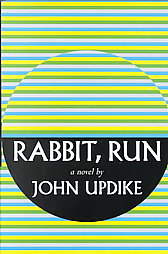
Along my journey to read the most influential novels of all time, I came across John Updike’s Rabbit Run. While a fantastic book with remarkable prose, this must be one of the saddest books I’ve read in recent memory. I found it just as easy to empathize with each character as I did to despise. To quickly summarize, the book chronicles the wandering journey of the philandering Rabbit, an ex-high school basketball star who is growing increasingly dissatisfied with his domesticated life.
In a way, I can relate to Rabbit’s growing frustration. It’s not so long ago that I remember the crazy nights of college—going out, partying, living the life of a bachelor and hardly being concerned for the future. How fast this all came to a halt—graduation, finding a job, graduate school, serious relationships, and an engagement have all put a halt to my crazy lifestyle. Do I miss those days? Of course. There is something to be said about the freedom of having a few beers and watching TV until 3:00 AM, or going skateboarding whenever the urge struck. Granted, this may not compare to Rabbit’s wife and child, his soul crushing job as an appliance salesman, or his cramped apartment, but I think it is an all too common aspect of maturation in modern life. Aside from my personal identification with this character’s struggle, it seems to be a comment on the growing dissatisfaction with 1950’s America and suburban life.
I have read in a review that this book was Updike’s response to On the Road, a focus on the families left behind rather than the bohemian adventurers traveled across the country in search of a nameless and shapeless prize. This way of thinking certainly puts the book into perspective and aids in the understanding of Updike’s intention.
As stated before, many of the characters were abhorrent. Rabbit’s inability to cope with his responsibility as a husband and as a father leaves us ashamed for all men. His wife’s weakness and her compulsion to drink was shameful. The mothers of the main characters and their tendency to manipulate their children were unpleasant. The Episcopal Reverend Eccles and his obsession with his own theological struggle at the expense of his family and parishioners was disheartening.
Everywhere we look in this novel we see struggle and melancholy, but even more saddening is that we see it as our own. Perhaps it is only me, but Updike has a way of describing the events in a way that can only aid in our understanding of each character, and for this I hate him. Yet, in the same breath I commend him on writing such a touching story and allowing readers to truly feel his message. This was a fantastic read and should be required for any 20-something young man.
In a way, I can relate to Rabbit’s growing frustration. It’s not so long ago that I remember the crazy nights of college—going out, partying, living the life of a bachelor and hardly being concerned for the future. How fast this all came to a halt—graduation, finding a job, graduate school, serious relationships, and an engagement have all put a halt to my crazy lifestyle. Do I miss those days? Of course. There is something to be said about the freedom of having a few beers and watching TV until 3:00 AM, or going skateboarding whenever the urge struck. Granted, this may not compare to Rabbit’s wife and child, his soul crushing job as an appliance salesman, or his cramped apartment, but I think it is an all too common aspect of maturation in modern life. Aside from my personal identification with this character’s struggle, it seems to be a comment on the growing dissatisfaction with 1950’s America and suburban life.
I have read in a review that this book was Updike’s response to On the Road, a focus on the families left behind rather than the bohemian adventurers traveled across the country in search of a nameless and shapeless prize. This way of thinking certainly puts the book into perspective and aids in the understanding of Updike’s intention.
As stated before, many of the characters were abhorrent. Rabbit’s inability to cope with his responsibility as a husband and as a father leaves us ashamed for all men. His wife’s weakness and her compulsion to drink was shameful. The mothers of the main characters and their tendency to manipulate their children were unpleasant. The Episcopal Reverend Eccles and his obsession with his own theological struggle at the expense of his family and parishioners was disheartening.
Everywhere we look in this novel we see struggle and melancholy, but even more saddening is that we see it as our own. Perhaps it is only me, but Updike has a way of describing the events in a way that can only aid in our understanding of each character, and for this I hate him. Yet, in the same breath I commend him on writing such a touching story and allowing readers to truly feel his message. This was a fantastic read and should be required for any 20-something young man.
No comments:
Post a Comment